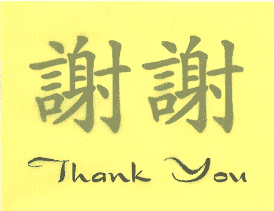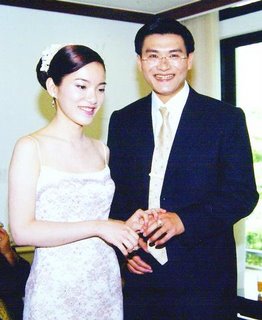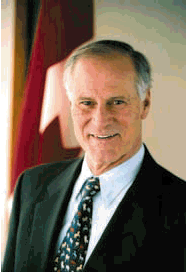FICTION:
I will, sporadically, be posting some of my fictional work on this blog. Not only does this genre provide the reader (and the author) a refreshing and hopefully welcome pause from the travails of reality, but it also allows the author to explore reality in a slightly different way. Please note, however, that 1st-person narrrative notwithstanding, the events below haven't necessarily transpired in the author's life. That said, as with every work of fiction, some of the inspiration may very well have drawn from the autobiographical.Oil and Water
For the life of me I cannot remember the reason why I went into the temple in the first place. I must have felt an urge for spiritual guidance of some sort, though I would hardly characterize myself as the type who relies upon such matters for sustenance. Regardless, the fact of the matter is that one morning I found myself heading for a small temple, squeezed in between a commercial bank and an electronics store, located in a not so quiet area of the city.
The roof of the temple had the usual multicolored intricate designs, as if a sculptor had been tasked with expressing the furies of a tempest in wood. Above the entrance, two dozen red lanterns were hanging on a wire. From the outside, one could already smell the burning incense.
The first thing that struck me as I entered the temple was how the interior resembled that of the Catholic churches that, as a child, my parents had forced me to go to. My few, unsuccessful attempts at refusing to pray to a deity in which I didn’t believe had invariably resulted in a series of stares from my mother, stares so cold as to chill the blood. I often wonder if my almost pathological aversion for all things religious might not perhaps have sprung from that period in my life.
But to return to the matter at hand—the resemblance lay mostly in the fact that instead of a series of thin mattresses one usually finds in a temple, the whole hall was filled with wooden pews and cushioned genuflectors, just as in a church. These contrasted with the decorations on the walls, which were indisputably Buddhist, consisting of the usual golden statues, flower arrangements, red lanterns and cherry wood carvings, all partly veiled by the incense fumes that sailed like specters as people moved about. A recording was playing faint Buddhist chants accompanied by dripping water. I chose the fifth row on the right side, preferring isolation to the otherwise crowded section on the left towards the back of the hall.
My suspicion that this was no traditional Buddhist temple was compounded by the appearance of the monk, who ostensibly would be our celebrant. His features—the big, potato-shaped head with the glisteningly sweaty forehead, red puffy cheeks, and the swine-like nose slightly pulled upwards—were anything but Asian. His corpulent stature made him look all the more ridiculous in the salmon-colored monk’s robe that he wore. (Months later, I learned from an article published in a local newspaper that the deceased, the reason for whose expiry was qualified as “suspicious,” was from the Canadian Prairies and had grown up on a ranch.)
The manner in which he held the Buddhist ceremony also didn’t quite ring true. Now by no means am I an expert on religious matters, but the way I had imagined how a Buddhist ceremony would go certainly did not involve a man making a sermon, in English, in a wireless microphone. But this is exactly what we were served, and looking round me at the predominantly Asian audience, I realized that they didn’t seem to have noticed how unorthodox the whole affair was. I’d often heard of how international the Asian metropolis had become, and how, under certain circumstances, Asian people would do their utmost to imitate things Western. If ever there was one, surely this was a display of this phenomenon being pushed to an extreme.
Five people were sitting on small stools behind the monk, their faces displaying the undeniable symptoms of deep enrapture.
The sermon, a thunderous and sporadically echoic affair, was an exercise in rhetorical convolution and syntactical contrivance. Its meaning, if there was one, slipped though my fingers like putty. Again, I cast a quick glance round me, and to my surprise people were nodding their heads, as if in approval of some truth. I seemed to be alone in my incapacity to access the man’s wisdom.
“Existence,” the voice boomed, “is not sufficient to satisfy the need for the light, for only the light, high above and deep inside, scintillating, provides the meaning of our existence.” Eventually, the rambling circularity of the monk’s confabulatory mantras had a soporific effect on me, and I fell into a half slumber. Perhaps, I thought as I sank into the quicksand at my feet, this was where the nodding came from.
When I woke up, the monk was agitatedly pointing a finger at the back of the room, and in a loud, enthusiastic voice, was inviting someone to come over on stage.
“This is splendid,” he was saying. “It doesn’t matter what you look like or what you’re wearing. Come over here and let us all take a good look at you!”
Moments later, the distinct sound of high heels echoed in the hall. I looked round, and for a while couldn’t locate the origin of the noise. Then, above the benches, I saw a blond head bobbing; as she cleared the aisle, her full body appeared. For a second or two I thought she was a child. Her dwarfishness—for even with the high-heeled boots she couldn’t have been more than four feet tall—added to her already absurd appearance. Her features were clearly Asian, but her hair was platinum blonde and she had applied such a liberal amount of mascara on her eyes that her face looked as if it consisted of two disproportionately large black eyes only. The knee-high boots were a bright yellow, with white laces, and ended at the hem of her flimsy white skirt. The denim blouse that she had on gave her a cowgirl air. As if the scene weren’t surreal enough already, people started whistling and cat-calling her as she hesitatingly tottered on stage. She blushed, but continued on until the monk caught her by the wrists and drew her to him.
“You see,” he exclaimed, “this is what I mean!” Grabbing her by the shoulders, he forced her, much like a kid, to face the crowd. People started applauding, and the woman hid her face in her hands. She seemed unsure whether she should smile or cry.
“In fact,” the monk continued, the applause tapering off, “in fact, nothing matters. This very moment, our friend here could go in there”—he pointed at the wall behind him, where, between two sitting Buddha statues, what looked like a gigantic laundry shoot trapdoor was set—“with these fine people behind me here”—his hand described a semicircle in front of the five people—“and we would not judge her.” The woman’s face appeared between her hands, and she looked at the monk with palpable apprehension.
“Now that I mention it,” he continued, “why don’t we just do that?” There were cheers from the crowd as the five individuals, three men and two women, stood up. One of them, I now realized, was a very tall and rather gaunt-looking Caucasian, with a generous forehead and gray frizzling hair behind the ears. Cowgirl, by now terrified, tried to leave the stage, but the monk seized her wrist before she could flee. She winced in pain and her feet swung in the air as he effortlessly lifted her off the ground. As if the whole scene had been rehearsed, the gaunt-looking Caucasian held the trapdoor open, and one by one the others jumped in. After that, the monk carried the squirming woman with one arm and, sacrifice-like, dropped her in. The gaunt man followed, his long limbs folding like a spider’s, and the trap closed behind him.
Grinning widely, the monk turned back to his worshippers. “Whatever happens in there—and you know what’s going to happen in there—doesn’t matter at all,” he crooned. The grin melted into a funeral earnestness, and the tone of his voice reflected the change, dropping by an octave. “It is like oil and water. Pour oil into water, and what do you end up with? Oily water. But they never mix,” he said, sagaciously. “They never become one.” His eyes had the distinctive quality of the blind, as if he were staring at something which was simultaneously distant and close by.
Confident that he had made his point, the monk turned off the microphone, dropped it on the floor, and headed towards the exit. All around me, people were silent, nodding to themselves as they pondered the deep truths that they had just partaken of. “They never mix!” his voice reverberated, as he walked out the door, robe billowing.
People began trickling out of the temple. I lingered on, trying to comprehend what had just transpired. After the last person had left the temple, I hurried over to the trapdoor and carefully opened it. I gazed inside. Darkness. Silence. There was no way to tell where the chute led, and I wasn’t about to jump in there to find out.
Once outside, I went round the temple, trying to establish where the trapdoor could have led. There was no annex to the building, only an uneven wall, thrown in the shadows, that curved slightly outwards at the bottom, where it disappeared into the thick foliage. So the chute must have led somewhere underneath the building, I thought. The hair at the back of my neck suddenly bristled, as if I were being watched. Something told me that I didn’t want to investigate any further.
I scampered off, only slowing down after I had put enough distance between me and the temple. As I was swallowed by the oblivious, uncaring reality of the bustling street, my thoughts turned to the puzzle of the oil and the water.
 Oh, and the guidelines even had provisions on how government officials were to thank each other in diplomatic notes. One thank you too many, or a more heartfelt one than was permissible, and Beijing was sure to be offended.
Oh, and the guidelines even had provisions on how government officials were to thank each other in diplomatic notes. One thank you too many, or a more heartfelt one than was permissible, and Beijing was sure to be offended. 




















